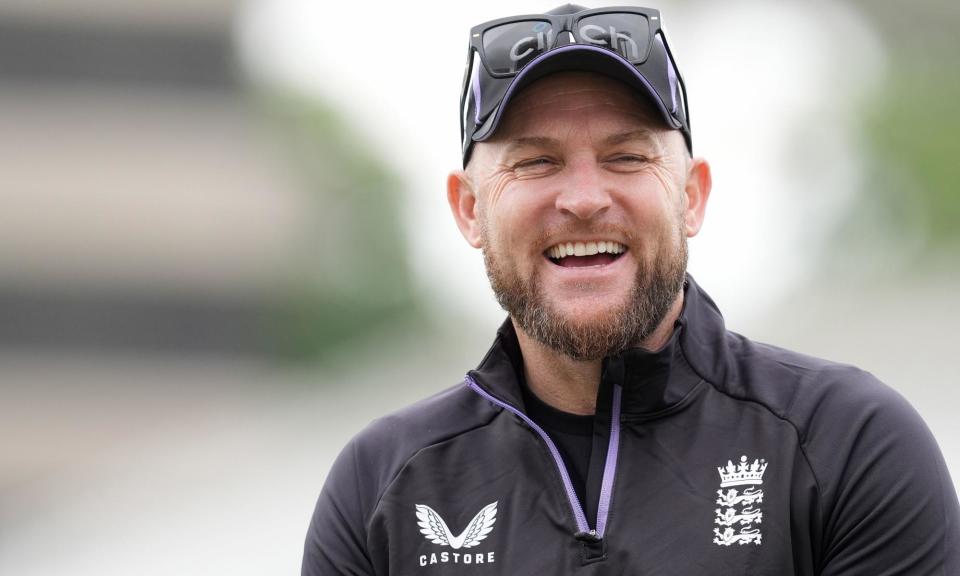
At the end of the final Test of the summer, against Sri Lanka starting on Friday at the Oval, Brendon McCullum will go home to New Zealand for what is being called a short break. The calm before the storm. In the 25 months since his appointment as head coach of England’s red‑ball side – they have played eight more Tests than anyone else – he has spent plenty of time there, striking a balance between feet up at home and feet up on Test ground balconies. All that is about to change.
England’s schedule – as he and Rob Key, England’s managing director of men’s cricket, referred to in announcing the Kiwi’s new dual role on Tuesday – eases slightly next year from a situation that has slipped the wrong side of ludicrous: August is only just over, but the next time England go as long as 48 hours without having a senior squad on duty it will be Christmas week.
Related: Brendon McCullum to take full control of England with white-ball coaching role
Though 2025 will be calmer England will play nine Tests, at least 20 one-day internationals (more if they perform well at the Champions Trophy) and a dozen Twenty20s. They will visit India, Pakistan, Ireland, New Zealand and Australia and host West Indies, India and South Africa. The following year starts with the final two Ashes Tests, a six-game white-ball series in Sri Lanka and a T20 World Cup, all done and dusted by the first week of March. It would take extraordinary commitment for anyone to oversee it all.
Though it is only just over two years since Key decided to split the England coaching job in two, the possibility of one man taking charge of every senior fixture has come to seem almost impossible.
In practice that is how it may remain: there is surely a chance McCullum will be the first England coach for whom attendance at every match is not compulsory. His job, after all, is not really to provide tactical or technical analysis, to direct field placings or to pinpoint useful matchups. His task is to create a positive environment.
As Ben Stokes, his Test captain, said: “He is all about making everyone feel, in his words, 10 feet tall.”
He sees his role as being to challenge orthodoxies. Why should training sessions be compulsory? Why can’t a Test team score at five an over? Why should our opening batter have the same approach as all the other opening batters? More than anything, why does everyone take everything so seriously?
“I always felt when playing that everything was based around the cricket and sometimes you forgot to enjoy yourself,” he said in February 2023. “We want an environment where you want to turn up to work, have a good time, be the best version of yourself, push the boundaries of what you’re capable of. That’s our focus.”
In 2022, when McCullum was appointed to lead a failing red‑ball team and the Australian Matthew Mott got the job of guiding a white-ball squad that was enjoying a period of unprecedented success, it was clear which of those groups most badly needed an injection of positivity. Two years later, the tables have turned: performances and results in the longest format have massively improved, while in the past 10 months they have meekly surrendered the 50-over and T20 World Cups.
The fearlessness Eoin Morgan fostered in the white-ball group has evaporated since he passed the captaincy to Jos Buttler, with calamitous results. It will take more than a dose of good vibes to reverse that decline – those two tournaments had a succession of very obvious tactical missteps – but the most pressing challenge is to change the mood.
As Key sought to replace Mott it was obvious that what the squad most needed was for someone to do precisely what McCullum does. His task then was to persuade McCullum to do it.
Contract signed, the 42‑year‑old said: “Rob Key’s vision for the future of English cricket is something that really resonated with me.” Job done.
There had been a widespread assumption McCullum would leave England behind when his contract expired at the end of thee Ashes tour next winter. Now it extends past the 2027 home Ashes to the end of that autumn’s ODI World Cup.
What England have gained most of all is certainty: for all that this appointment hopefully presages a change of mood in the white-ball group, it also, and no less importantly, postpones the moment when the red-ball team will be forced to endure one.
Article courtesy of
Source link